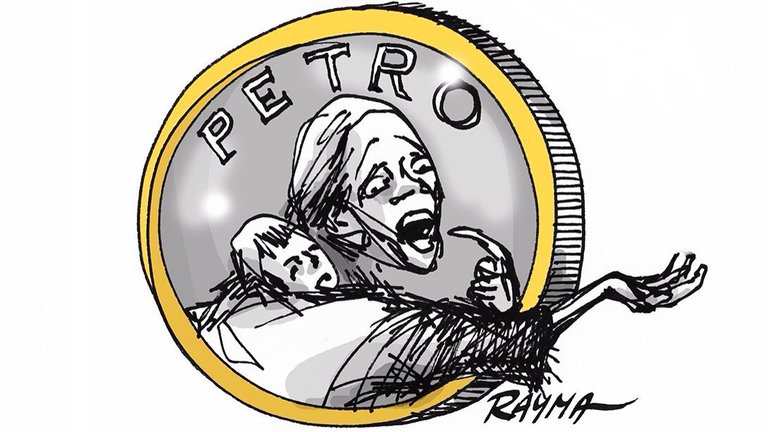If you're not a big observer from Venezuela, Maduro's claims of having raised millions of dollars at his February 20 event probably took you by surprise. This is how propaganda extends beyond its borders: the powerful say something scandalous, and the media, which do not want to get lost, rush to publish it. Some journalists even quote official sources verbatim, pretending not to know they are not reliable. Hey, it's worth being the first!
So let's make things clear. The petro, the issuance of illegal debts of Maduro in the cryptomoneda envelope, has not raised a dime. I'll tell you why.
First, the petro was not really launched on February 20. What Maduro launched was a seedy place full of confusion about what blockchain would be used, bad SSL certificates, 6-hour mail delays and JavaScript errors. As of today, a week later, there is still no way to open a wallet. There is no way to buy tokens. Hell, I was able to confirm that the government has not even developed any intelligent contract or issued any token.
So why did Maduro say he had raised so much money? Simple: it wants your attention, cryptocurrency. He knows that attention can become trust. To get it, use several ingenious psychological tricks that we Venezuelans know very well.
Do you realize that I'm not quoting the ridiculous figure that Maduro gave? I'm not going to play your anchor bias game. Do not trust, verify: did not offer any proof, and without a reference address in the blockchain where we could track the sales, there is no way we know, so we can only conclude that he invented the number. It would not be the first time that Maduro makes numbers to stay in power.
To kidnap his trust, Maduro also lied about having met with representatives of the NEM foundation, something that caused a bit of public relations nightmare to the people behind this blockchain. He then said that he is partnering with Aerotrading, "one of the biggest blockchain companies." What? Have not you heard about them? Come on, they tweeted for the first time the day after "the launch", welcoming the petro to its massive ecosystem that consists of exactly 91 lines of HTML.
But Maduro's deceptions do not end there. He expects to buy each petro for $ 60, because "that's the price of a barrel of oil." Except that extra-heavy Venezuelan crude is not worth as much when loaded on a tanker truck, much less on the ground, and certainly not at Ayacucho 1, the completely underdeveloped oil field that Maduro chose for "backup."
Wait, wait, wait, says the dictator. He can give you a discount, say 60%, to make you feel better about your investment. Let's say you bought one: did you really buy a claim on a barrel of oil? Oh no, you forgot to read the fine print of that backup promise, right? The Petro is a bolivar. Do not take it from me, Vitalik called him first. Read page 14 of the whitepaper carefully: Maduro's promise is to accept Petros at a rate that he himself establishes: a barrel of oil minus a discretionary discount that will be at least 10%, but get this without an upper limit!
The cons do not end there. Maduro will accept petros at his arbitrary pace and will return ... bolivares. Yes, the currency that can not be bought anywhere else in the world except Venezuela, the currency that hyperinflated and continues to print as if there were no tomorrow. While you had been reading this, the bolivar probably went down as a small percentage. It is the currency that stopped working.
Okay, but you could still ask if the petro could be good for the people of Venezuela. Can not Venezuelans escape the problems of their currency through the fixed supply promised by the petro? No. The initial sale will not be open to the bolivar-holders. Venezuela has had exchange controls for 15 years, which makes access to foreign currency a matter of regime connections: the government decides who exchanges money and who does not. It is illegal to exchange bolivars for currencies outside of this corruption scheme, and cryptocurrencies have not yet been legalized. The lawyers I have asked believe that the crypto-moons could be subject to sanctions, extortion and secret police raids like the ones the miners face.
Yes, there is a more expensive black market, and people could still buy bitcoins or ethers to participate in the sale of petro, but most Venezuelans can not buy food, do they really believe they are going to be ready for this? And for the few who make a sacrifice and buy a coin, why not simply buy the bitcoin

